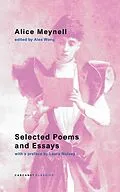Alice Meynell was a major British author of the late nineteenth and early twentieth centuries. This is the first anthology of her verse and prose to be published for over seventy-five years. Meynell was highly regarded both as a poet and as a writer of essays and was seriously proposed for the laureateship on two occasions. G.K. Chesterton said of her that she 'never wrote a line, or even a word, that does not stand like the rib of a strong intellectual structure; a thing with the bones of thought in it'. The present selection includes the early romantic poems of yearning, full of poignant surprises, and the terser, less personal poems of her maturity. Also included is a broad sample of Meynell's literary essays, in each case a careful work of art. They include reflections on literature, culture and the natural world, nuanced observations on childhood, and moving defences (both specific and general) of women against trespasses on their dignity. This selection is introduced by Alex Wong, who offers a poet's view of Meynell's distinctive artistic achievements and locates her within her literary contexts. It also includes an appreciative preface by the renowned feminist critic and theorist Laura Mulvey, who is the author's great-granddaughter.
Autorentext
Alice Meynell (née Thompson) was born in Barnes, Surrey (now London), in 1847 to a middle-class family of artistic and intellectual inclinations. She and her sister Elizabeth, later Lady Butler, a celebrated historical painter, were brought up in somewhat Bohemian style in various locations, including Liguria and the Isle of Wight. In 1868 Alice converted to Roman Catholicism and at around the same time fell in love with Father Dignam, the priest who received her into the Church. This impossible love informed many of her early poems. Her first volume of verse, Preludes, was published by Henry S. King in 1875 with illustrations by her sister. In the following year she met Wilfrid Meynell, a young journalist and fellow Catholic convert who admired her poems, and they married in 1877. (The name is pronounced to rhyme with 'fennel'.) The Meynells worked both jointly and independently on journalistic work, co-editing and copywriting for several periodicals as well as writing literary and critical essays, signed and unsigned, for others. They became important figures in the London literary world. Approached by the Catholic poet Francis Thompson, a homeless opium-addict seeking publication, they published and promoted his work and supported him financially and morally for the rest of his life. They had eight children, of whom one died in infancy. Several of the Meynell children became involved in literary life. Alice Meynell became established as a prolific and highly respected essayist, especially from the 1890s when her work began to be collected into books. The republication early in that decade of her youthful poems, along with a small number of more recent ones, also raised her reputation, and in later life she returned to more frequent writing in verse. Her books of essays and poems, published at first mainly by John Lane at The Bodley Head and from 1913 by Burns and Oates, were many times reprinted, and she was in high demand as a columnist and reviewer. An outspoken advocate for women's suffrage as well as other political causes, she was President of the Society of Women Journalists and Vice-President of the Women Writers' Suffrage League. On two occasions she was proposed for the role of Poet Laureate. She inspired ardent and devoted friendships, notably in the poet Coventry Patmore (whose passionate love for her necessitated a painful break in their friendship) and in George Meredith during his final years. In 1911 the Meynell family moved to Greatham, Sussex. Alice Meynell died in 1922 at the age of seventy-five.
